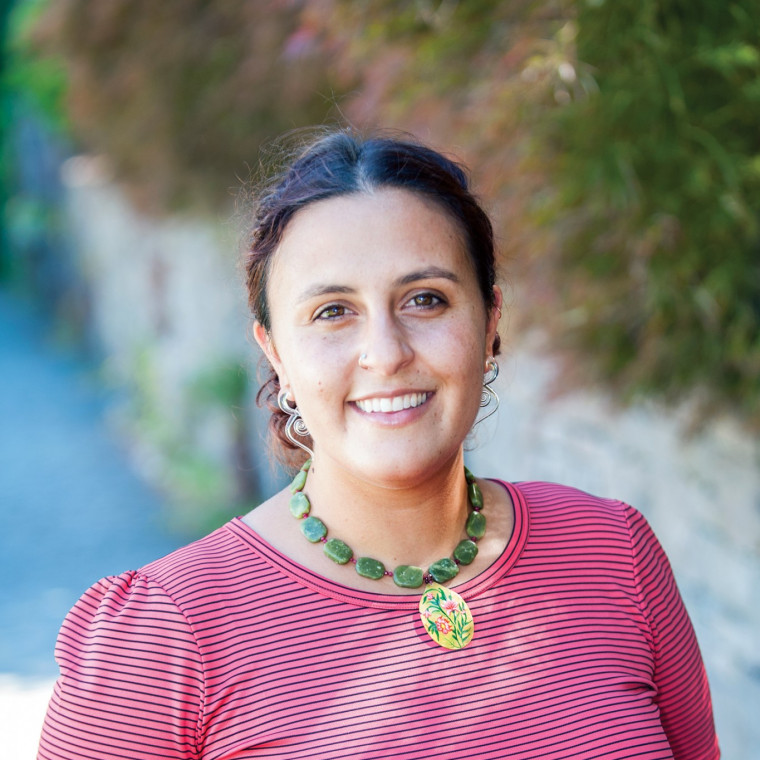Argan Oil Aids Moroccan Women
Open gallery

Renda Nazzal BA ’12
Traveling down a newly paved road in southwest Morocco, Renda Nazzal looked out the car window at ambling sheep, goats, and camels.
In the distance, miles of native argan trees dotted the landscape with families picnicking in their shade. Women in traditional garments picked fruit from the trees’ prickly branches, scooping up fallen pieces from the ground.
“The argan tree helps make life possible for the Berber people in this semi-arid climate,” says Nazzal. “Its deep roots stabilize the soil and prevent erosion.” And its fruit is proving to be a stabilizing economic factor for the area.
Nazzal is helping transform the lives of Moroccan women and their families through The Argan Project, an import business she launched in 2015. Working with a local cooperative, she sells pure argan oil along with an organic skin care and accessory line. She’s also introducing handmade textile products from Moroccan artisans.
“Running an ethical business that provides fair wages is essential to me,” says Nazzal, who visits Morocco on an annual basis.
Nazzal’s journey to entrepreneurship began at Lewis & Clark. With an eye on working abroad, she decided to major in international affairs and “took enough anthropology classes for an honorary second major.” Oren Kosansky, associate professor of sociology and anthropology, invited her to join his first overseas study program to Morocco in spring 2011, and she jumped at the chance.
“Moroccans welcomed me with open arms,” says Nazzal, who speaks basic Arabic and whose heritage is Palestinian. “The taste of mint tea, the scent of pungent spices, the sounds of life buzzing on every street stimulated my senses.”
Reluctant to leave when the program ended, she joined a project titled Tools for Tolerance, led by Samantha Stein BA ’11. With the help of a grant from 100 Projects for Peace, Stein, Nazzal, and other volunteers created a cultural center in a poverty-stricken area of Casablanca.
When she returned to Portland for her senior year, she applied for and won a Fulbright Scholarship. After graduation, she headed to Agadir, a city in southwest Morocco, to teach English as a second language. “I was the first Fulbright recipient to teach in Agadir.”
It was there, chatting up locals in lively open-air markets, that she saw women cracking argan kernels to reveal seeds, a labor-intensive process. She learned how vital argan trees are to the community. They provide wood for building, fruit for livestock, kernels for fuel and heating, and seeds to convert to oil for culinary, medicinal, and cosmetic use.
Nazzal joined forces with Arlo Malmberg BA ’12 and Haley Blake BA ’12 to launch The Argan Project. The trio of young alums entered the 2013 Venture Competition, sponsored by Lewis & Clark’s entrepreneurship center, and secured $3,000 in seed funding. Eventually, her partners moved on to other ventures, and Nazzal took charge.
To help ensure her business’s success, she partnered with an innovative Moroccan cooperative that purchases argan fruit from farmers and delivers it to women in their homes, where they care for their families, earn a fair wage, and choose their work schedules. She then moved back to San Diego and began importing 100-percent pure argan oil and other natural skin care products such as rose water and black olive soap. Initially selling directly to the public at open-air markets, Nazzal is now courting large companies, dramatically expanding online sales, and marketing at special events.
Her biggest success story to date is with GlobeIn Artisan Boxes. The company purchased 6,000 bottles, each filled with 200 liters of oil, for its monthly artisan box subscribers. In total, the order provided 4,000 hours of work for 120 women living in four different villages.
In addition to the wages the Moroccan women receive, Nazzal is planning an additional way to help them share in her success. “In the near future, as sales increase, I plan to return a percentage of The Argan Project’s total sales to the Moroccan women and organizations involved,” says Nazzal. “Giving back is an important component of my business.”
—by Pattie Pace
More L&C Magazine Stories
Lewis & Clark Magazine is located in McAfee on the Undergraduate Campus.
MSC: 19
email magazine@lclark.edu
voice 503-768-7970
fax 503-768-7969
The L&C Magazine staff welcomes letters and emails from readers about topics covered in the magazine. Correspondence must include your name and location and may be edited.
Lewis & Clark Magazine
Lewis & Clark
615 S. Palatine Hill Road MSC 19
Portland OR 97219

